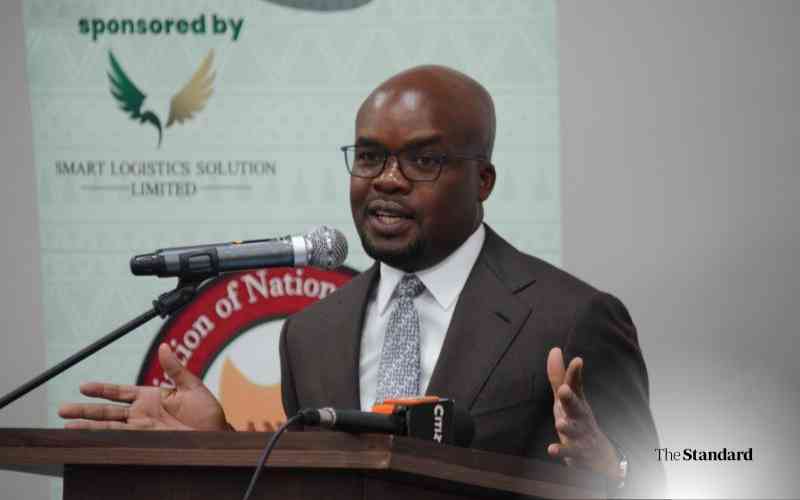Despite legal setbacks, the government has vowed to continue carrying out reforms in the National Police Service, Kenya Prisons Service and National Youth Service.
According to Internal Security Principal Secretary, Raymond Omollo, the recent court ruling will not derail the reform agenda, as it touched only on a few recommendations proposed by the task force headed by former Chief Justice David Maraga.
The High Court declared President William Ruto’s move to establish the national task force to review police welfare unconstitutional.
Justice Lawrence Mugambi ruled on April 10, 2025, the President violated the Constitution and, therefore, the 23-member task force was unconstitutional and any decision made by it, is also invalid.
But Dr Omollo maintained the ruling targeted only reforms touching on the affairs of the National Police Service Commission (NPSC) and disclosed that the government is considering challenging the court ruling.
“We will pursue a legal redress on the ruling to address those matters that were pronounced on the task force. We have done much of the work so far,” he said on Thursday after meeting members of the National Steering Committee on Police Reforms.
The court decision, Dr Omollo said, primarily focused on the role of the National Police Service Commission and challenged only 16 out a total of 271 recommendations made by the Maraga task force.
According to the Interior ministry, the court ruling targeted only three Terms of Reference (TORs) out of the 30, and as a result, the affected recommendations are; reinstatement of competitive and transparent recruitment for top leadership, introduction of vetting process for senior officers, amend quorum rules and redefine chairperson qualifications for NPSC to enhance efficiency.
Professionalise HR through certified personnel, develop pre-retirement plans, raise entry qualifications and raise recruitment age, extend training periods while incorporating international policing and human rights standards, automate and regulate postings and transfers, base promotions on merit, institutionalise performance-based rewards, and prepare officers for retirement through structured transition programmes.
Others are post-service support, recommend a phased salary increase, propose delinking police remuneration from civil services schemes, improve recreational, educational, and housing services, and introduce affordable housing schemes.
“As you are aware, the bulk of the recommendations touched on issues that were operational and administrative in nature; there were recommendations that were legal that require legal policy review and guidelines, and there are those that touched on building capacity, particularly modernization of the Services,” he stated.
According to the Internal Security PS, the ruling did not affect the Kenya Prisons Service and the National Youth Service. He, however, assured that reforms will continue in line with the rule of law.
“We did come up with a strategic framework to guide us in the implementation process, we met this morning to review the process we have made, and about 50 per cent of those recommendations have been implemented, another 30 per cent are being rolled out while the balance are issues that need policy guidelines,” explained Dr Omollo.
Areas of urgent focus are on improved salaries, housing, medical and group life insurance, enhanced training, and modernisation. Dr Omollo said the accelerated changes had already borne fruit.
Stay informed. Subscribe to our newsletter
He attributed the success in implementing the reforms in the three services to support from stakeholders.
“As the chair of the National Steering Committee, I wish to inform the country that we are on track with these reforms,” he said.
Dr Omollo stated that the reform agenda was central to enhancing accountability, operational efficiency, and the welfare of officers.
“The reform journey we embarked on is not just about systems and structures; it is about restoring trust, dignity, and professionalism in our security institutions,” he said.
Adding: “These are the men and women who stand at the frontline to safeguard our nation, and we owe it to them; we should provide better working environments, adequate tools, and clear policy direction.”
The Committee identified funding shortfalls, bureaucratic bottlenecks, delayed policy development, and low stakeholder engagement as the main obstacles to the timely execution of the reform agenda.
Dr Omollo said the Government, through the State Department of Housing, was constructing houses for officers in the three services.
A total of 10,000 housing units were earmarked for the officers of the Kenya Prisons Service, he said.
The PS called for enhanced resource allocation from the National Treasury and emphasized the need for collaborative action among security agencies, policymakers, and development partners for the reform agenda to continue with the momentum.
He urged the National Police Service Board, NPSC, and the relevant technical committees to prioritise fast-tracking the recommendations, especially those that do not require immediate funding.
“The success of these reforms depends on the collective will of all stakeholders. We must move beyond reports and recommendations and ensure that the intended changes are felt at the grassroots, in the lives of officers, and in the confidence of our citizens,” said Dr Omollo.
Present at the meeting were Public Service PS Jane Imbunya, Inspector General of Police Douglas Kanja, Commissioner General of Prisons Patrick Aranduh, and James Tembur, Commandant General of NYS.

























